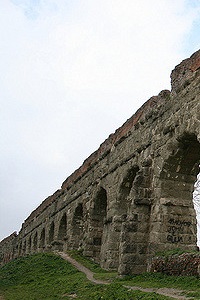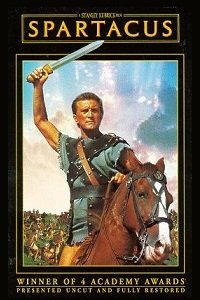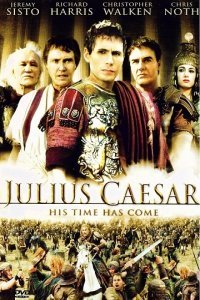The Late Republic (147 - 27 BC)
Evolution of Roman society in the late second century BC
Updated on: 1 May 2023Reading time: 10 minutes
Rome's dominance in the Mediterranean led to significant changes in its society during the late second century BC. The elite became exceedingly wealthy due to the Mediterranean trade and the spoils of war, while a new class of equestrians also emerged. The equestrians amassed wealth through trade, and some even rose to the rank of senators, despite a theoretical prohibition against senators engaging in trade. However, the equestrians had limited power in the Senate, and conflicts often arose between them and the old patrician class of senators. Many of these conflicts centered around land reform, specifically the redistribution of land owned by the aristocracy to the plebeians.
Another change in society during this period was the widespread enlistment of Romans in the military. Rome needed soldiers to defend its vast territories, and for many Romans, becoming a soldier was a way to obtain land after serving for 20 years. However, this also meant that many Romans were stationed far away from their homes in the provinces, leading to underutilization of agricultural lands by ordinary Romans.
To compensate for this, agriculture increasingly relied on latifundia, large private lands that produced grains, wine, and olive oil and were dependent on foreign slave labor, equivalent to modern-day industrialized agriculture. As a result, paid work for Roman citizens decreased, and unemployment rose sharply. Inequality in Roman society also became more pronounced during this time.
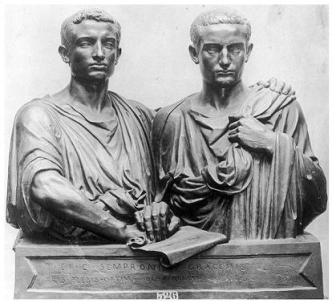
The Gracchi brothers |
The high rate of unemployment led to a rise in crime and the emergence of violent gangs that intimidated the population. Some of these gangs were even controlled by senators, who used them for their own purposes. In contrast, tribunes were elected officials who acted on behalf of the plebeians. They convened and acted as the president at the Plebeian Council, proposed legislation before the council and Senate, and had the power to block decisions taken by magistrates. Any assault on a tribune's person was strictly forbidden, as they were highly respected.
In the 2nd century BC, the Gracchi brothers, Tiberius (elected in 133 BC) and Gaius, were two tribunes who attempted to pass land reform that would redistribute land owned by wealthy landowners among the plebeians. However, they were murdered by gangs controlled by senators, and land reforms previously passed were reversed. This led to a growing opposition between the equestrian classes (part of the optimates) and the plebeian classes (part of the populares). The optimates wanted power concentrated on the aristocracy, while the populares sought the support of the people.
Late Republic: 107 BC to 27 BC
In 107 BC, Marius was elected as Roman consul and he went on to hold this position seven times. Initially, he focused on defeating the Numidian king, Jugurtha. Marius is also known for his military reforms, which included recruiting poor men without land into the army, thereby making the soldiers more loyal to their general. As previously mentioned, Roman soldiers were usually rewarded with land after their military service.In 91 BC, Tribune Marcus Livius Drusus granted Roman citizenship to the socii or allies of Rome, but this decision was not well-received by many Romans, leading to his assassination. His assassination, in turn, triggered the socii revolt, also known as the Social War (91-88 BC). This war occurred after Marius retired, but he was eventually appointed as the head of the army, along with Lucius Julius Caesar and Sulla.
Sulla and Marius were rivals during the Numidian War and had opposing factions. At the end of the Social War in 88 BC, Sulla became consul and was tasked with defeating King Mithridates of Pontus, who had intentions of conquering the eastern Roman territories. However, Sulla was infuriated to learn that Marius had become head of the military with the help of his supporters.
Sulla's March into Rome
Sulla's march into Rome is one of the most notorious events in Roman history. He led his legions into Rome and executed all of Marius' supporters, impaling their heads in the Roman Forum. Marius managed to escape the march and returned a year later while Sulla was campaigning in Greece. He seized power and executed all of Sulla's supporters in the same manner, in what is now known as the Marian Massacre.
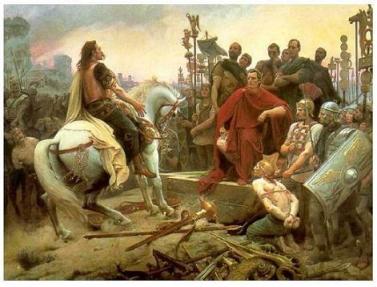
Vercingetorix throws down his arms |
Marius died in 86 BC, and his successor Cinna held power until his death in 84 BC. Sulla returned to Rome in 83 BC after finishing his campaigns in Greece and the East. During his reign, thousands of nobles and hundreds of senators were killed.
By the mid-first century BC, the gap between the rich and the poor was greater than ever before, as was the divide between the populares and optimates. Sulla worked for the optimates and eliminated all populist leaders. He also passed constitutional reforms that stripped power from the tribunes, who defended the interests of the plebeians. The extreme inequality between the aristocracy and the poor farmers led to the Catalinarian conspiracy, which ultimately failed. As consul, Cicero quickly captured and executed all the conspirators.
The Triumvirate
Out of the turbulent period emerged Gaius Julius Caesar, who was on the side of the populares despite being from a respected aristocratic family. To attain power, Caesar reconciled two very powerful men and rivals, Marcus Licinius Crassus and Gnaeus Pompeius Magnus. Crassus had supported Caesar early on in his career, and Gnaeus Pompeius Magnus had married Caesar's daughter.
This alliance of three men was called the Triumvirate, and it benefited everyone. Crassus, who was the richest man in Rome, became even richer and achieved control of the military. Gnaeus Pompeius Magnus increased his influence in the Senate, and Caesar became consul and head of the military in Gaul. The three men ruled Rome.
However, many events led to the disintegration of the Triumvirate. In 54 BC, Caesar's daughter and Pompeius' wife died during childbirth. In 53 BC, Crassus was killed in the Battle of Carrhae while invading Parthia. Caesar and Pompeius became rivals, both being generals. Caesar had successfully conquered Gaul, which made him extremely wealthy and earned him the respect and admiration of his legions and many people in Rome.
Moreover, Caesar was on the populares' side, and many optimates hated him. Sensing a threat, Pompeius tried to strip Caesar of his legions and subsequently exile him. However, Caesar entered Rome with his troops in 49 BC. Pompeius, his supporters, and some of his legions fled Italy and were subsequently chased by Caesar. In the Battle of Pharsalus, Caesar killed many of Pompeius' supporters, and in 48 BC, Pompeius was killed in Egypt.
Caesar became the sole ruler of Rome, serving as consul four times in five years. He was also named dictator four times, once for ten years and once for perpetuity. However, many aristocrats hated him, given that Caesar was on the side of the populares. In 44 BC, he was assassinated in what we call the Ides of March by the Liberatores.
The assassination of Caesar shook Roman society to its core, as most Romans had appreciated his populist policies. After his death, a Second Triumvirate ruled Rome for five years, composed of Mark Antony, Caesar's colleague, Octavius, Caesar's adopted son, and Marcus Aemilius Lepidus, Caesar's best friend. Mark Antony was in charge of the eastern provinces, Octavius of Italy, Hispania, and Gaul, and Lepidus of Africa.
At the beginning of the Second Triumvirate in 42 BC, up to 300 Senators who participated in the Ides of March by the Liberatores were executed, and their property was confiscated. During the same year, Caesar's assassins and the leaders of the Liberatores were killed in the Battle of Philippi. The Senate deified Caesar, naming him Divus Iulius, and Octavius became Divi Filius. This did not mean that Caesar was considered a deity, but rather a highly respected historical figure.
Despite the support of the people (populares), many aristocrats (optimates) still hated the Second Triumvirate. Mark Antony's brother, Lucius Antonius, led a revolt that ended with the execution of hundreds of senators and equites on the anniversary of the Ides of March. Mark Antony spared the life of his brother, Lucius.
In 38 BC, the Second Triumvirate was renewed for five years, but the relationship between the three men deteriorated. In 36 BC, Lepidus betrayed Octavius in Sicily and was forced to retire. In 34-33 BC, Mark Antony lived in the kingdom of Egypt ruled by the beautiful Cleopatra VII, and they became lovers. This was considered an act of treason for Rome, and Mark Antony's lavish lifestyle in Egypt bothered many people in Rome.
As ruler of the eastern provinces, Mark Antony threatened the territorial integrity of the Roman Republic. Eventually, war broke out between Octavius and Antony, and the Roman army destroyed Antony's forces in the Battle of Actium in 31 BC. Mark Antony and Cleopatra committed suicide, and Rome took control of Egypt. The Battle of Actium is depicted in the famous painting by Lorenzo Castro called The Battle of Actium (1672).
SOURCES
- The History of Rome (Grant, Prentice Hall, 1978)
- Fall of the Roman Republic (Plutarch, PEnguin, 1988)
- The Civil War of Caesar (Julius Caesar, Penguin Classics. 1976)
- Florus: Epitome of Roman History (Florus, Harvard University Press , 1929)
